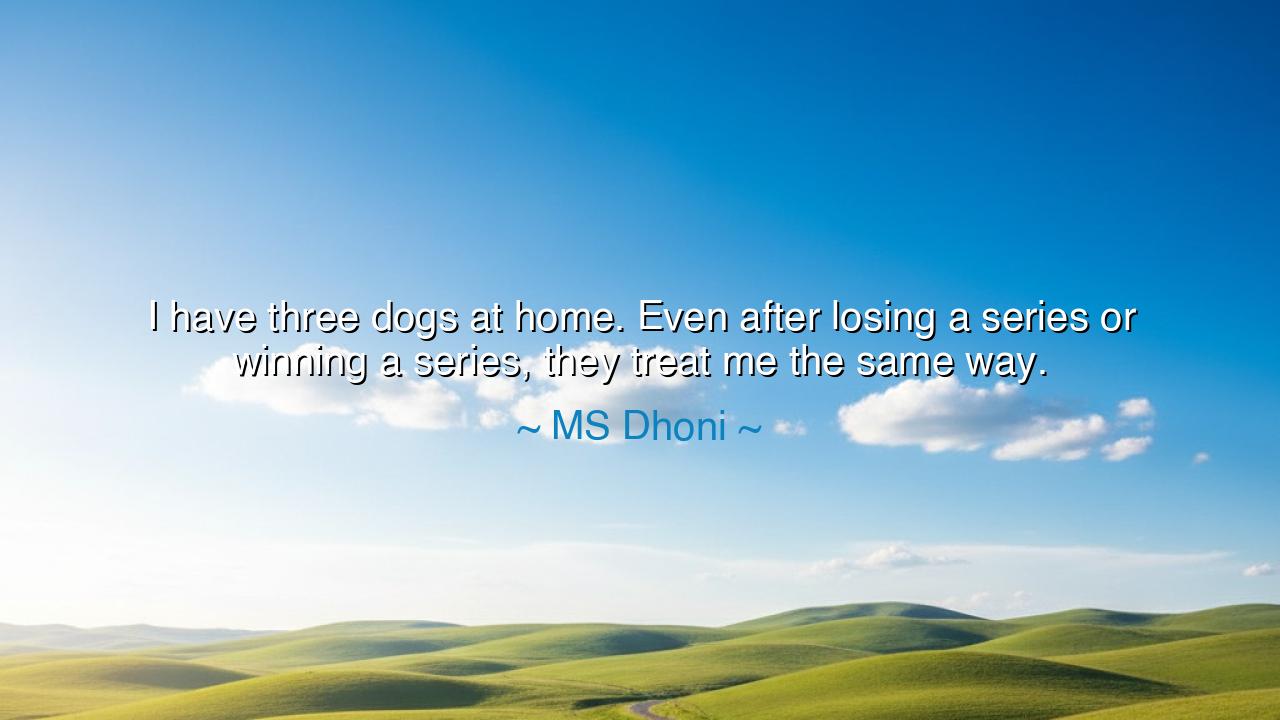
I have three dogs at home. Even after losing a series or winning
I have three dogs at home. Even after losing a series or winning a series, they treat me the same way.






The words of MS Dhoni — “I have three dogs at home. Even after losing a series or winning a series, they treat me the same way.” — may sound simple, yet they carry the deep serenity of a man who has learned the art of balance. In this humble reflection lies a truth that transcends the boundaries of sport — the truth that unconditional love and inner peace matter more than triumph or defeat. Dhoni, the calm and unshakable captain who once carried the hopes of a billion souls, speaks here not as a cricketer, but as a sage. His dogs, in their innocence, become his teachers — reminders that in a world obsessed with results, the heart must remain uncorrupted by the rise and fall of fortune.
In the ancient world, philosophers often sought symbols of constancy amidst the storms of life. The Stoics, like Epictetus and Marcus Aurelius, taught that virtue is not found in victory, but in equanimity — the power to stay the same in success and failure. Dhoni’s words echo this timeless wisdom. When he says his dogs treat him the same after a win or a loss, he is pointing to the eternal truth that true love and peace come from beings — and hearts — untouched by ego. The animals do not care for trophies, headlines, or applause. They see not the captain, but the man. They are the living embodiment of acceptance, teaching by their quiet presence what countless philosophers have written in books: that joy is found not in achievement, but in being seen without condition.
Dhoni’s life itself mirrors this philosophy. Known for his unflinching calm, even in moments of great pressure — like that fateful World Cup final in 2011 — he learned to stand still while the world roared around him. But such calm is not born on the field; it is born in the home, in the heart, in the silent moments when one remembers what truly matters. The dogs, in their simplicity, reflect to him the truth of humility: that whether one rises or falls, the worth of a soul remains unchanged.
There is a story from the life of Emperor Ashoka, who once conquered kingdoms with the sword, but found peace only when he turned to compassion. After the bloodshed of Kalinga, he realized that power and victory are fleeting, but kindness endures. Like Ashoka, Dhoni too reminds us that what follows us beyond the field, beyond the arena, beyond the noise — is not the record or the glory, but the love we give and receive. The dogs’ unwavering affection becomes the mirror of a higher truth: that those who love without judgment are closer to the divine than those who love only the victorious.
When Dhoni returns home — weary from defeat or glowing from triumph — and his dogs greet him with the same joy, it is as though the universe itself whispers: “You are enough.” In their wagging tails lies the great lesson of detachment. The world may crown you today and forget you tomorrow, but love — pure, uncalculating love — remains constant. His dogs are not merely pets; they are the guardians of his soul, pulling him back from the illusion of fame to the simplicity of being alive.
To the listener, this quote is more than a gentle thought — it is a call to seek grounding amidst the chaos of ambition. Surround yourself, as Dhoni does, with what is real: with relationships and creatures that love you for your essence, not your achievements. Learn to cherish silence as much as applause. Let humility dwell beside greatness. And when life exalts or humbles you, remember that neither state defines your worth.
So, my children of the future, learn from Dhoni’s wisdom — and from the ancient stillness it reflects. The world will forever measure you by your victories, but the soul measures you by your constancy. Seek not those who praise you in triumph, but those who embrace you in loss. For they are your true companions — like Dhoni’s dogs, who love not the hero, but the man.
And when you too have won and lost, risen and fallen, may you return — as he does — to a home of peace. Let your own heart become like those faithful dogs: loving without condition, steady amidst storms, and forever rooted in the quiet joy of simply being.






AAdministratorAdministrator
Welcome, honored guests. Please leave a comment, we will respond soon